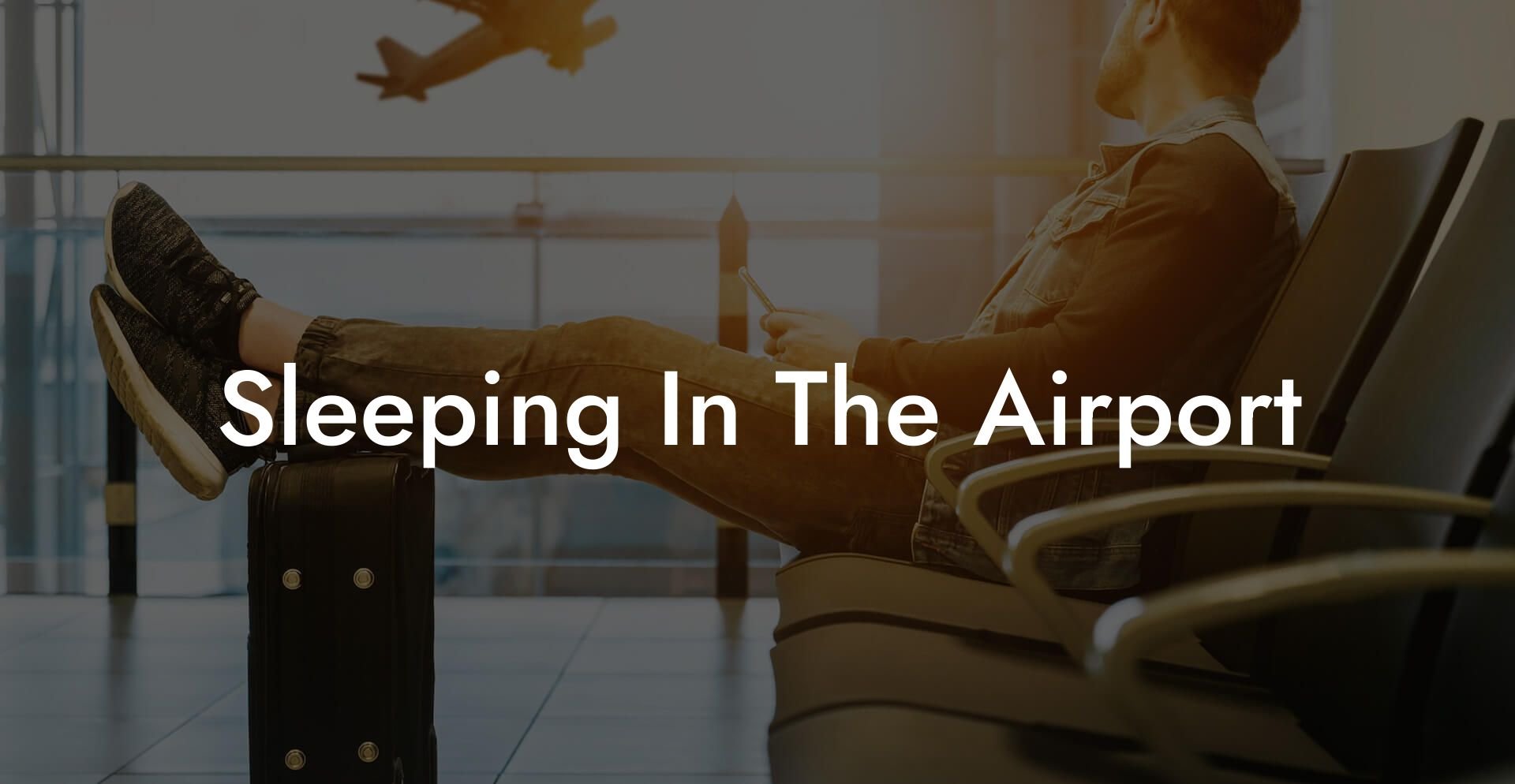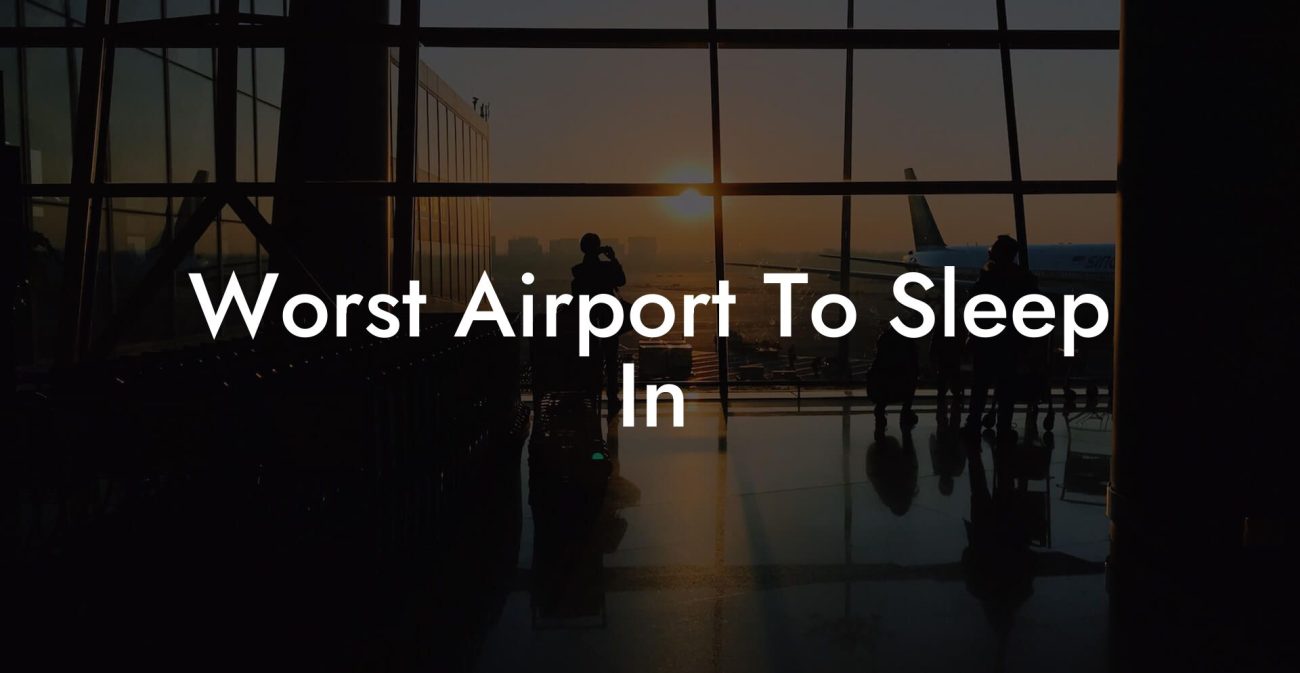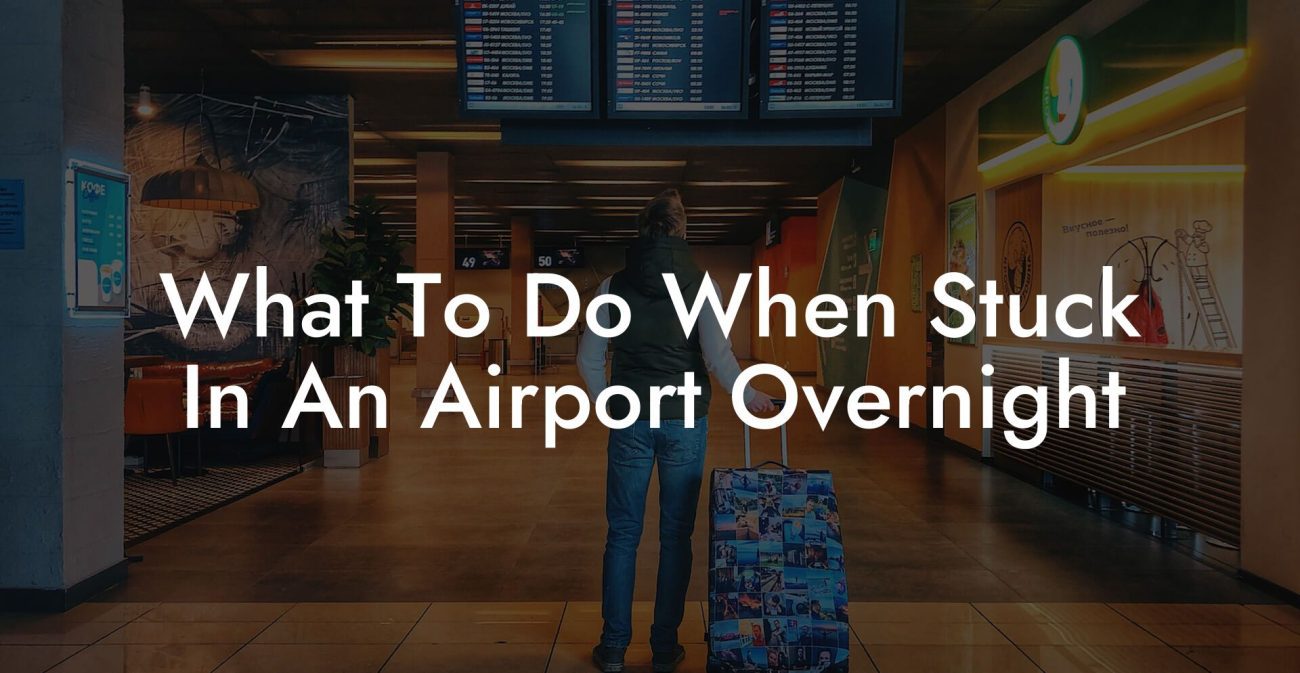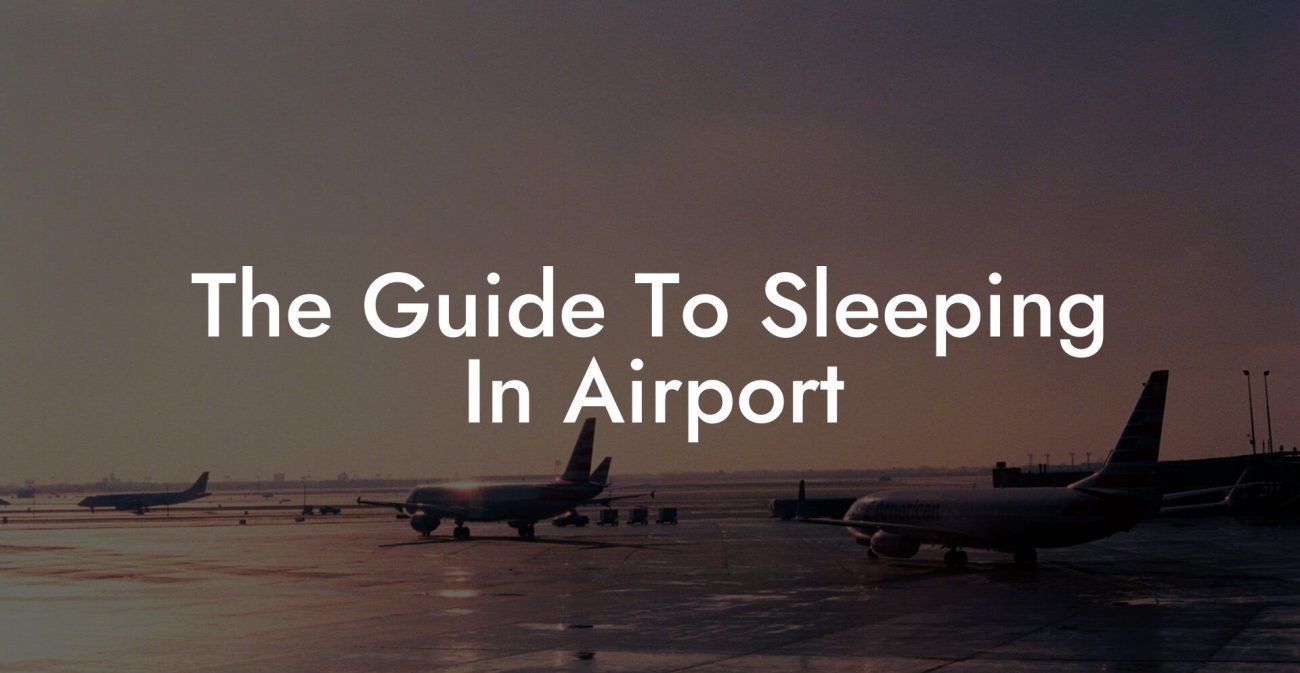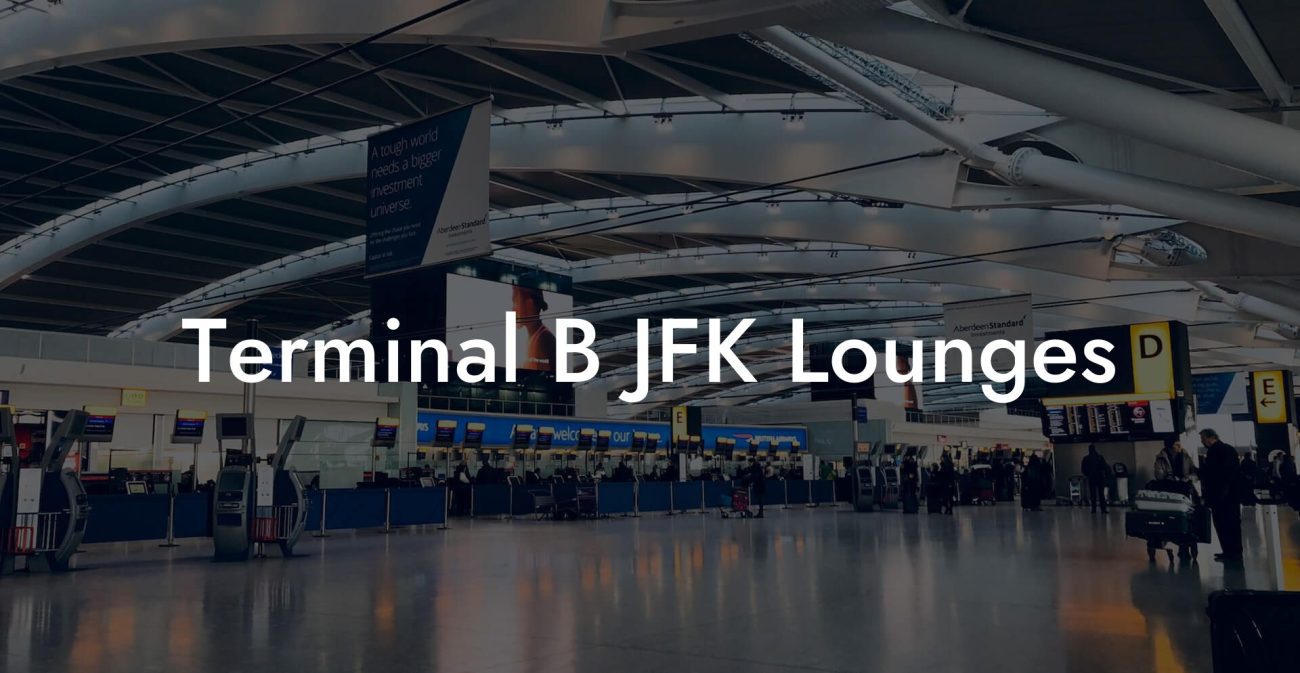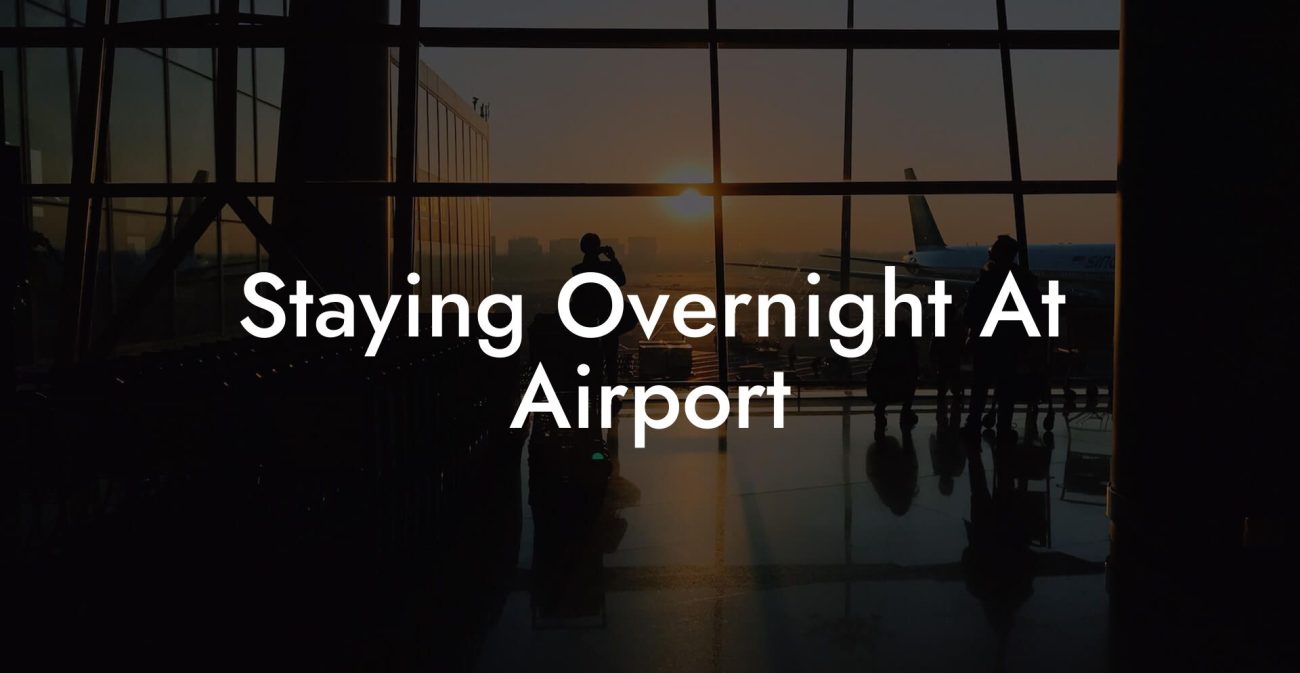Ever found yourself in an airport at 3 a.m., cradling a half-full cup of Starbucks and wondering if the glossy tile floors could double as a makeshift bed? Welcome to the unexpected world of sleeping in the airport—a phenomenon that’s as much a rite of passage for Gen-Z and millennials as it is an impromptu sleepover with your fellow travelers. This guide dives deep into the art and science of airport sleep, from the cushioned allure of sleek sleeping pods to the resourceful hack of transforming a quiet corner into your own personal snooze station.
Quick Links to Useful Sections
- The Rise of Airport Sleeping Culture
- Understanding the Phenomenon: Why Do We Sleep in Airports?
- The Evolution of airport sleeping pods: A Modern Oasis
- Essential Airport Sleep Hacks and Tips for the Resourceful Traveler
- 1. Scout Out the Best Spots
- 2. Assemble a Portable comfort Kit
- 3. Leverage Airport Amenities
- 4. Use Technology to Your Advantage
- 5. Master the Art of Disguise
- Preparing for Your Unexpected Overnight Airport Adventure
- The Unexpected Perks of Airport Sleeping: Beyond Just a Nap
- Finding the Perfect Sleeping Spot: Strategies to Outsmart the Crowd
- Tech Tools and Apps That Enhance Your Airport Sleep Experience
- Safety, Security, and Etiquette: Navigating the Pitfalls of Airport Sleeping
- Traveling on a Budget: Embracing the Art of Airport Sleep for Millennials and Gen-Z
- Resources and Community Support: Your Next Steps
- Airport Sleeping FAQs: Your Questions Answered
- Your Journey to Restful Nights in Transit
- Exploring More: Innovative Articles and Communities to Join
- Final Reflections on the Art of Airport Sleep
The Rise of Airport Sleeping Culture
Once a domain reserved for the jet-lagged and weary, airport sleeping has exploded into a bona fide culture. Thanks to budget airlines, erratic travel schedules, and an ever-increasing need to optimize every minute, travelers around the world are discovering that the airport terminal is more than just a corridor between flights—it’s a temporary home, a social hub, and sometimes, a surprisingly comfortable place to catch some much-needed shut-eye.
With the advent of sleeping pods and designated nap zones in major international hubs, airports are transforming from sterile transit zones to multi-faceted spaces that cater to our modern need for rest, connectivity, and even a bit of luxury. This evolution is fueled by innovative design solutions, savvy entrepreneurs, and a community of travelers eager to exchange tips, tricks, and the occasional extra blanket.
In this digital age, where every minute counts, learning how to navigate the ins and outs of airport sleep is a skill worth mastering. Whether you’re a serial layover veteran or an occasional traveler caught in an unexpected delay, buckle up for a comprehensive exploration of everything you need to know about catching those z’s at the airport.
Understanding the Phenomenon: Why Do We Sleep in Airports?
The reasons behind sleeping in an airport are as varied as the travelers themselves. For some, it’s a matter of necessity—a delayed flight, an overnight layover, or a last-minute cancellation forces their hand into finding sleep within the terminal walls. For others, it’s a deliberate choice driven by budget constraints, the desire for adventure, or simply the thrill of breaking away from the usual hotel routine.
Exploring the Motivators:
• Cost-Effective Travel: Accommodations can be pricey, especially in major cities; airports offer a free or low-cost alternative for those who can brave a night on the go.
• Flexibility & Spontaneity: The airport environment appeals to the modern traveler who values flexibility and the excitement of the unexpected.
• Cultural Curiosity: Observing the endless stream of global citizens, each with their own story, adds a rich layer of cultural engagement to your travel narrative.
Beyond necessity, sleeping in airports has morphed into a subculture celebrated on social media, with travelers sharing reviews of the best (and worst) sleeping spots, cozy corners, and innovative sleeping pods. This communal exchange of information not only helps improve individual travel experiences but also influences airport designs and amenities for the future.
The Evolution of airport sleeping pods: A Modern Oasis
At the heart of this revolution are airport sleeping pods—futuristic, compact compartments that offer a private space to recharge. Unlike the traditional image of a dubious, hard bench, these high-tech retreats bring a touch of luxury to the hectic environment of an airport.
What Are Airport Sleeping Pods?
Think of them as a blend between a capsule hotel and a personal chill zone. Equipped with features like adjustable lighting, integrated charging ports, privacy screens, and sometimes even soundproofing, these pods are engineered to help even the most restless traveler achieve a state of Zen amidst the chaos.
Airports in cities like Tokyo, Seoul, Dubai, and even smaller regional hubs are increasingly integrating these pods into their infrastructure. They cater not just to transit passengers, but also to business travelers, digital nomads, and anyone in need of a quiet escape. With apps that allow you to book a pod by the hour, these spaces epitomize convenience and efficiency for the modern traveler.
The design aesthetics of sleeping pods tend to lean towards minimalism—a calming, uncluttered space that helps you shut out the buzz of announcements and the murmur of terminal chatter. For tech-savvy millennials and Gen-Z individuals who value both style and functionality, these pods offer an attractive alternative to traditional hotel rooms.
Essential Airport Sleep Hacks and Tips for the Resourceful Traveler
Not every airport flaunts glamorous sleeping pods, and sometimes you’ll have to make do with what you have—a hard bench, an underutilized lounge or an empty corner near your gate. Fear not! A few strategic hacks can turn these less-than-ideal spots into surprisingly comfortable rest stops.
1. Scout Out the Best Spots
Timing is everything. Arrive early enough to explore different terminals and note which areas offer the best lighting, seating, and accessibility to power outlets. Look for quieter corners away from high-traffic areas or near less frequented gates.
2. Assemble a Portable comfort Kit
Your carry-on should include travel essentials like a neck pillow, a lightweight blanket, earplugs, and an eye mask. Consider investing in a travel pillow with adjustable support and even a compact, inflatable footrest.
3. Leverage Airport Amenities
Modern airports offer a range of amenities—from free charging stations and WiFi to designated relaxation areas. Some even have lounges that allow access for a fee. Utilize these spaces strategically to ensure you get the comfort required for a decent nap.
4. Use Technology to Your Advantage
A variety of apps cater to airport sleepers: from noise-cancellation soundtracks and guided meditations to sleep tracking and alarm features. Download a few to help you relax, block out distractions, and wake up refreshed for your next boarding call.
5. Master the Art of Disguise
There’s no harm in blending in. Carry a book, wear a hoodie, or even strategic layering which can help you decide whether to keep warm or nonchalantly shift into “hibernation mode.” Discretion in the airport can be a superpower.
These simple, yet effective tips ensure that whether you’re crashing in a high-tech pod or a hidden corner of the terminal, you’ll be ready to transform a mundane wait into a mini-retreat.
Preparing for Your Unexpected Overnight Airport Adventure
Not every layover is planned, and sometimes delays force you to spend the night in the terminal. Preparation is key, even if the circumstances are less than ideal. Begin by packing smart and thinking ahead about what you’ll need to turn the airport into an impromptu resting space.
Pre-Flight Preparation:
• Plan Your Carry-On: Choose lightweight items that can be easily rearranged into a sleeping kit.
• Clothing Checks: Dress in layers. Airports can be unpredictable, ranging from freezing air-conditioned spaces to warm waiting areas.
• Stay Informed: Download your airline’s app and set up alerts for gate changes and delays. A steady stream of information can alleviate the anxiety of unpredictable travel.
At the Airport:
• Upon arrival, identify your options—whether it’s a quiet lounge, a designated rest area, or that underrated corner behind the duty-free shops.
• Secure your valuables by keeping them close, ideally in a travel pouch or anti-theft backpack.
• Be prepared to shift gears. Sometimes a spot that looks ideal might turn out to be a noisy hotspot, so always have a backup plan.
In essence, sleeping in an airport isn’t just about finding a place to nod off—it’s a comprehensive strategy combining planning, flexibility, and a dash of creativity. With the right mindset and a few tricks up your sleeve, you’ll find that airport napping can be both practical and even enjoyable.
The Unexpected Perks of Airport Sleeping: Beyond Just a Nap
While catching a few hours of sleep is the primary goal, sleeping in the airport offers a host of unexpected advantages that go well beyond mere rest. In fact, this unconventional experience can unlock opportunities for networking, cultural exchange, and personal reflection.
Networking on the Fly:
Airports bring together diverse groups of people—travel enthusiasts, entrepreneurs, digital nomads, and global citizens. Strike up a conversation with a fellow traveler, and you might find yourself swapping travel hacks, business insights, or even making a valuable connection for your next adventure.
Finding Solitude and Self-Reflection:
Amid the constant hum of announcements and the steady flow of travelers, airport sleeping provides an unexpected space for self-reflection. Armed with only your thoughts and a pinch of solitude, you have the perfect backdrop to meditate on your recent experiences or plan out your next moves.
The Budget-Friendly Bonus:
For budget travelers, the financial savings cannot be overstated. With hotels and accommodations in many cities costing a pretty penny, the option to sleep in the airport transforms an inconvenience into a smart budget hack—saving money that can be redirected into more memorable experiences.
The Social Media Goldmine:
Let’s face it—airports are teeming with quirky visuals and intriguing backdrops ideal for your next viral Instagram post or TikTok video. From stylish sleeping pods to candid snapshots of fellow travelers mid-siesta, there’s plenty of content waiting to be captured and shared.
Far from being just a necessity during travel hiccups, airport sleeping can enhance your overall travel experience by offering these additional perks. It’s a holistic approach that not only optimizes your downtime but also enriches your journey in unexpected ways.
Finding the Perfect Sleeping Spot: Strategies to Outsmart the Crowd
One of the greatest challenges of airport napping is staking out a spot that offers both comfort and safety. Here’s where a mix of strategic planning and local knowledge comes in handy.
Start by doing a quick reconnaissance of the terminal as soon as you arrive. Identify underutilized areas like quiet seating zones, tucked-away corners near shops that close early, or spaces adjacent to less busy gates. Some airports even have designated “nap zones” that come equipped with reclining chairs and charging stations—so do your research ahead of time.
If you’re uncertain about the vibe in a given area, look for signs of locals or frequent travelers who might signal which spots are more welcoming for a solid snooze. Over the years, user-generated reviews on travel blogs and social media forums have accumulated a wealth of insider tips on the best—and worst—places to crash in an airport.
Equally important is remaining adaptable. The best-laid plans might quickly change once crowds swell or announcements disrupt your peace. In such cases, having a couple of alternative spots in mind—like a relatively quiet lounge area or even a less obvious seating nook behind a row of restaurants—can be the difference between a restful nap and a night of restless tossing and turning.
Tech Tools and Apps That Enhance Your Airport Sleep Experience
In today’s digital era, technology isn’t just for entertainment and connectivity—it can also be your best ally in catching quality sleep in the airport. Various mobile apps and accessories have emerged to help you block out noise, monitor your sleep cycles, and even locate the nearest charging station.
Noise-Cancellation Apps & Headphones:
Invest in a pair of high-quality, noise-cancelling headphones or earbuds. Apps like “Noisli” or “Calm” provide ambient sounds designed to drown out the excessive terminal chatter and the hum of rolling suitcases, crafting your own peaceful bubble.
Sleep Tracking and Meditation Apps:
For those curious about optimizing their sleep cycle even while on the move, sleep tracking apps paired with smartwatches can provide insights into your sleep quality. Meditation apps like “Headspace” or “Insight Timer” help guide you through relaxation techniques, priming your mind for rest amidst a bustling environment.
Airport Navigation and Amenity Locators:
Apps such as “GateGuru” and various airline-specific apps offer real-time updates on amenities and facilities available within the terminal. From knowing where the nearest charging station is to finding a quiet zone or a sleeping pod reservation system, technology has turned the airport landscape into a navigable playground.
These tech tools not only streamline your search for the perfect sleeping spot but also enhance your overall travel experience by providing a sense of control and predictability—an essential ingredient for a good night’s sleep.
Safety, Security, and Etiquette: Navigating the Pitfalls of Airport Sleeping
While the airport offers a viable alternative when hotels aren’t an option, it’s important to be mindful of safety and etiquette. Ensure you protect both your belongings and your personal space without inconveniencing fellow travelers.
Keep Your Belongings Secure:
Always keep your valuables in sight. A travel lock, a cable organizer, or even a body-worn bag can deter potential opportunists. It’s a balancing act between being aware and not drawing undue attention to yourself.
Follow the Unspoken Rules:
Airports have their own etiquette—respect quiet zones, keep your belongings neatly arranged, and avoid monopolizing seating intended for transient use. Small acts of courtesy, like sharing charging spots and keeping noise to a minimum, go a long way in fostering a respectful, communal environment.
Personal Safety:
Trust your gut. If an area feels too crowded or unsafe, consider relocating. Familiarize yourself with the layout of the airport and locate the nearest information or security desk in case you need assistance.
By staying vigilant and maintaining a courteous demeanor, you ensure that airport sleeping remains a viable, stress-free option for everyone involved.
Traveling on a Budget: Embracing the Art of Airport Sleep for Millennials and Gen-Z
Budget travel has always been a hallmark of the millennial and Gen-Z ethos, and airport sleeping fits neatly into this philosophy. When every dollar counts, turning an unexpected layover into a free mini-vacation might be just what you need.
Embrace Minimalism:
Editing your travel budget means prioritizing experiences over luxury. Embrace the minimalist lifestyle by investing in multi-purpose travel gear that not only saves space but also converts seamlessly into your comfort kit.
The Social Side:
Sharing your airport sleeping experience isn’t just about saving money—it’s about joining a community. Social media platforms and travel forums are rife with tips from budget travelers who elevate airport napping into an art form. Their stories, hacks, and recommendations can provide both practical advice and a sense of camaraderie when navigating the unpredictable world of air travel.
Maximizing the Freebies:
Many airports offer free WiFi, charging stations, and even virtual workspaces, which you can take advantage of while resting. Combine these free resources with your sleeping pod or comfy corner hack to enjoy a productivity boost even during transit downtimes.
For the budget traveler, the airport is not just a stopover—it’s an extension of your journey where every moment, every hack, and every dollar saved adds up to a richer, more adventurous travel experience.
Resources and Community Support: Your Next Steps
Navigating the world of airport sleeping is easier when you’re plugged into a network of like-minded travelers and resource hubs. There are countless blogs, forums, and travel groups dedicated to sharing the latest tips and hacks—from detailed reviews of sleeping pods to insider information on the coziest spots in bustling terminals.
Join Online Communities: Platforms like Reddit, Facebook travel groups, and specialized travel forums often feature detailed discussions and firsthand accounts of airport sleeping. By engaging with these communities, you not only stay informed about the best sleeping spots but also share your own experiences to help others navigate their journeys.
Utilize Travel Apps and Websites: In addition to navigation apps, websites like SleepingInAirports.com offer comprehensive guides, reviews, and forums specifically tailored to unconventional travelers. These resources are invaluable for staying updated on new airport amenities, evolving sleeping pod designs, and innovative travel hacks.
Plan Ahead: While spontaneous travel is part of the fun, a little planning can go a long way. Use aggregator sites to check for airport amenities, user reviews, and even live updates on terminal conditions to ensure your next layover is as comfortable as possible.
The travel community is a treasure trove of information. By leveraging these resources, you empower yourself to turn airport sleeping from an inevitable inconvenience into a smart, strategic, and even enjoyable part of your travel repertoire.
Airport Sleeping FAQs: Your Questions Answered
Below are some frequently asked questions about sleeping in airports, covering everything from the basics of finding a spot to tips on staying safe and sound during your impromptu sleepover.
1. Is it safe to sleep in an airport?
Yes, most airports are safe for sleeping, especially if you choose less crowded areas and keep your belongings secure. Always remain aware of your surroundings and have a backup plan in case your chosen spot gets noisy.
2. What are the best airports for sleeping?
Some of the best airports feature designated sleeping pods, quiet zones, and ample seating. Major hubs like Tokyo Narita, Seoul Incheon, and Singapore Changi consistently rank high for their traveler-friendly accommodations and amenities.
3. How do I find an available sleeping pod?
Many airports now offer mobile apps or online booking systems for sleeping pods. Alternatively, user reviews and websites dedicated to airport sleeping can provide up-to-date information on pod availability.
4. What essential items should I pack for an overnight stay in the airport?
Essential items include a travel pillow, a lightweight blanket or shawl, earplugs, an eye mask, and any necessary charging cables or portable chargers. Keeping your valuables in a secure, close-by travel pouch is also key.
5. Can sleeping in the airport save money on hotels?
Absolutely. Many budget-conscious travelers save hundreds of dollars by taking advantage of available sleeping spaces in airports, especially when faced with long layovers or unexpected delays.
6. How do I manage hygiene while sleeping in a public space?
Maintaining hygiene is important. Pack travel wipes, hand sanitizer, and a change of clothes if needed. Use designated restroom facilities and stay aware of airport cleaning schedules to stay comfortable.
7. What if I’m uncomfortable or cold?
Dress in layers and consider packing a compact, travel-friendly blanket. Choose spots near temperature-regulated areas or lounges whenever possible.
8. Are there specific apps to help manage airport sleeping?
Yes. Apps that offer features like ambient noise generators, meditation guides, and real-time airport amenity locators are extremely helpful to ensure you have a restful pause during your wait.
Your Journey to Restful Nights in Transit
Embracing the idea of sleeping in airports is not merely about making do—it’s about transforming every pause in your journey into an opportunity for relaxation, self-reflection, and even connection. Whether you’re nestled in a state-of-the-art sleeping pod or curl up in a quiet corner with your trusty travel pillow, every moment of rest recharges your spirit for the next big adventure.
Your journey as a traveler is as dynamic as the destinations you seek. The ability to sleep comfortably at an airport is a testament to your adaptability, resourcefulness, and boldness in embracing both unpredictable delays and the excitement of spontaneity. Let each layover be a chance not just to wait, but to discover a new facet of travel—one where the terminal becomes a playground, a refuge, and a canvas for creativity.
As you pack up your gadgets, check the flight status one last time, and settle into your chosen spot, remember that every laid-back hour contributes to the tapestry of your travel narrative. With the tips, tools, and insights shared in this guide, you’re not only prepared for your next airport sleep adventure—you’re set to redefine what it means to rest on the fly.
Here’s to restful nights, unexpected connections, and the endless thrill of travel. Whether you’re a seasoned airport sleeper or a rookie testing the waters for the first time, may your journey be as comfortable as it is unpredictable.
Exploring More: Innovative Articles and Communities to Join
The world of airport sleeping is constantly evolving, with new innovations and trends emerging as airports update their infrastructure and travelers continue to reimagine the transit experience. Expand your horizons by exploring in-depth articles on travel hacks, tech innovations in airport design, and community-driven reviews of the latest sleeping pod technologies.
Engage with travel bloggers who specialize in budget travel, airport reviews, and innovative transit solutions. Their firsthand experiences not only provide actionable tips but also foster a sense of community among travelers. Social media platforms, dedicated travel forums, and blogs are brimming with stories, reviews, and discussions that help you stay ahead of the curve.
Remember, the more informed you are, the smoother your journey will be—even if it means spending the night in an airport. From insider tips to community support, every piece of information transforms a potential inconvenience into a memorable experience.
Final Reflections on the Art of Airport Sleep
As you move forward in your travel adventures, remember that airport sleeping is not simply a backup plan—it’s a lifestyle hack for the modern, on-the-go generation. It’s a blend of practicality and unpredictability, a moment where the hustle of travel meets a pause for rest. Every layover provides a unique canvas, painted with the hues of unforeseen encounters, bold decisions, and moments of genuine self-care.
Embrace the journey, whether it takes you to the comfort of a high-tech sleeping pod or the quiet solitude of a hidden corner in a bustling terminal. Your ability to adapt and find solace in the in-between moments is a true mark of a seasoned traveler.
So, next time your flight is delayed or you find an extended layover looming on your itinerary, smile at the unexpected opportunity for rest. You’re now armed with the knowledge, tips, and community insights to transform any airport into a haven of relaxation and even a bit of adventure.
Welcome to the modern travel experience—where every moment is a chance to rest, recharge, and rediscover the art of living on the go.
Useful Interruption: Dive deeper into the world of airport sleeping guides with our most popular sections. If there is anything you think is missing or anything you would love for us to write about, just give us a shout.
- General Airport Sleeping Guides
- Travel Gear & Equipment Recommendations
- Regional and Airport-Specific Guides
- Airport Sleeping Pods & Reviews
- Health, Safety, and Comfort Tips for Airport Sleepers
Last week, I decided to try the world-famous "airport sleepover" experience. Imagine this: I'm lying on a bench in Terminal C, surrounded by suitcases that have seen more of the world than I ever will, and a PA system that sounds like a karaoke machine on a sugar rush. I pull out my travel pillow—which, by the way, is more like a sad deflated balloon—and declare, "Tonight, I’m the king of this terminal!"
Soon enough, fellow travelers become my unexpected audience. One guy, fresh off a red-eye, whispers, "Hey, do you think if we sleep long enough, we can catch our flight in our dreams?" I reply, "Sure, and maybe I'll even get an upgrade to first-class in my nap!" The airport lights flicker like a disco ball, and every time someone announces a delayed departure, it’s like a punchline to our impromptu stand-up routine.
As I finally drift off, I dream of a world where boarding passes are like VIP tickets to the best sleepover party ever—a party where the only baggage is the laughter you carry with you. Waking up, I realize the airport is still the same, but I now hold the honorary title of "Terminal Comedian," a title I wear with as much pride as my permanently mismatched socks!

